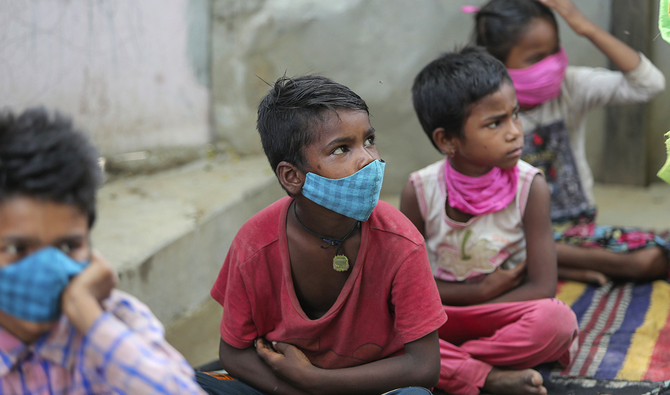NEW DELHI: Despite Indian government assurances to provide free food and education to children orphaned by the COVID-19 pandemic across the country, a majority continue to face an uncertain future after losing one or both parents amid the second wave of the pandemic.
In a recent report, the National Commission for Protection of Child Rights (NCPCR) said that 3,621 ophans had lost both parents to the disease, while more than 26,000 had lost one parent.
“We are still in the process of compiling data, but looking at the initial figure, it looks grim,” an NCPCR official told Arab News.
“The challenge is to reach out to them and extend all support,” he added.
Shainza Sadat, 12, lost her mother to COVID-19 in the third week of April in the capital city, New Delhi, after her family failed to find hospital bed space.
“Life is difficult now in my mother’s absence,” Sadat told Arab News, adding: “Everything is established. Our main support system has gone.”
Her father Anwar said that since his wife’s death, “the family was without an anchor.”
He added: “The pandemic has jolted us. It’s not easy to raise a 12-year-old daughter single-handedly without her mother’s support.”
The second wave of the pandemic across India earlier this year claimed more than 300,000 lives and wreaked havoc across towns and villages in the country of 1.3 billion people.
After losing their father to COVID-19 late last year, Shatrudhan Kumar, 13, and his seven-year-old brother, from the Jehanabad district in the eastern state of Bihar, also lost their mother to the disease in April.
BACKGROUND
The Bihar government has registered 48 cases of children losing both parents and 1,400 cases of single parent deaths to COVID-19.
“I want to study, but now it’s a challenge to live without any support,” Kumar told Arab News.
“We are living with our relatives, but how long can we depend on them?”
The Bihar government has registered 48 cases of children losing both parents and 1,400 cases of single parent deaths to COVID-19.
“We are providing RS1,500 ($20) per month to each child who has lost their parents besides free education and free rations for the family,” Raj Kumar, director of Bihar’s social work department, told Arab News.
He added that a “widow is also getting $6 every month and free rations for the family.”
However, Bihar-based child rights NGO center, DIRECT, questioned the figures claimed by the government, and is now seeking “higher compensation for the victims.”
“I believe the figure of the children without a single parent or any parents must be double of what the government is saying,” Suresh Kumar, director of the NGO, told Arab News.
“The situation is bleak in rural areas. There are children whose parents have died due to COVID-19, but they don’t have proof to show that they lost their parents to the virus,” Kumar said, adding: “As a result, they are not getting the benefits announced by the government.”
On May 29, Prime Minister Narendra Modi announced welfare measures for children who had lost their parents to COVID-19. Part of the measures requires the government to take care of children’s education, with a $14,000 corpus created for each child, which they can avail after turning 23.
However, officials and NGOs worry that children left without parents now face the double threat of neglect and vulnerability to exploitation and human trafficking.
Sonal Kapoor of NGO Protsahan, based in the capital, questioned the narrative of supporting “orphans of the pandemic” while “ignoring the larger question.”
According to Kapoor, who works for vulnerable children facing rights violations, an overwhelming majority of orphaned children are being forced into child labor.
“Among the children in distress cases that have erupted and we are working to support, fewer than 5 percent are children who have lost parents, but the remaining 95 percent are facing severe cases of child labor, child hunger and even sexual exploitation within families,” Kapoor told Arab News.
“In the last three months, the 48 slum communities where we work in Delhi have seen an escalation in cases of child labor and using children — both girls and boys — for transactional sex by parents in exchange for food,” she said, adding: “Children have been pushed into child labor to supplement their family income and there is no saying if they will go back to school even if the pandemic ends.”
Kapoor said that adoption or institutional support was not a feasible option, as India’s adoption rate is low, with just 3,351 children being adopted last year despite thousands being orphaned.
“Every orphan child does not have to end up in a child care institute. A simple semblance of extended family with limited resources is any day better than life for a child in a shelter home,” Kapoor added.
Citing an example of two children who had lost both their parents to COVID-19 last month, Kapoor said that they were left in the care of elderly grandparents, where “the poor grandmother is working overtime to meet the requirements of the teens.
“As an NGO, we support such families so that children grow under the patronage of their kith and kin,” she said.























